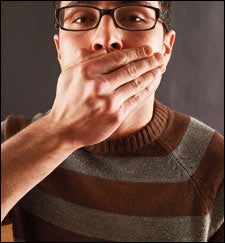SIX YEARS AGO, I was trying to establish myself as a freelance writer. So I was happily waiting tables at a brewpub when an editor at a certain men's title called to offer me my first big magazine assignment. The laddy rag had recently published a hit story about the astounding ease of shagging babes in Brazil, in which the author/everyman was virtually attacked by thong wearers from São Paolo to Salvador, and the editors wanted a sequel. Apparently, I was just the sort-of-handsome, kind-of-funny guy for the job. Was I interested?
Does Jell-O jiggle?!
We decided upon Sweden. I quit the restaurant and made plans to fly to Stockholm, stay in a lavish baroque-modern hotel, and hit on the most beautiful women in the swankiest downtown clubs. The only thing I lacked was desirability. Over the first four nights, woman after woman┬Śmost of them three inches taller than my five feet eleven┬Śrebuffed my advances with the social delicacy of a Viking warrior.
“I'm sorry,” one said with a look of disgust usually reserved for dirty toilet seats. “I haven't understood a single word you said.
I don't speak English.”
Redoubling my efforts, I prodded local connections for advice. It was suggested that I lower my standards. I assured them I didn't have any.
By day seven I'd spent roughly 7,000 kronor on appletinis and gyrated to every song in ABBA's catalog (twice)┬Śand had precisely one peck on the cheek to show for it. I called home, looking for sympathy.
“Stick with it, honey,” Mom encouraged.
Three nights later, my little black book was still empty and I was convinced my career was over before it had begun. I gave up, slinking away to a gaudy suburban dance hall with a friend of a friend. Lena wasn't exactly your stereotypical milk maid┬Śshe was a Turkish immigrant with curly red hair, working as a police dispatcher┬Śbut we genuinely hit it off. Soon enough, we were trading slobber in a dark corner, and I was so happy I would've sponsored her naturalization application.
Lena and her friend, who'd met up with us, had to go home soon┬Świthout me┬Śbut that was OK. I knew that artful editing would make our canoodling the story's glorious finale. I'd suggestively end the piece as we all left for the cab and┬Śbada-bing!┬Śmy cavorting among the ripe beauties of Stockholm would culminate in what was clearly the beginning of a threesome.
LAST YEAR, a pair of books blasted my sometimes dubious profession. The comic, nostalgic Do Travel Writers Go to Hell? chronicles a twenty-something Thomas Kohnstamm's attempt to update Lonely Planet: Brazil. Having graduated from Stanford University with an M.A. in Latin American studies, he hopes his humble revision will somehow “help us all to understand humanity and our common needs and desires a bit better.” Pffft. After Kohnstamm discovers he has only $283 to cover half the Brazilian coast, an amused hotelier in Canoa Quebrada fills him in on the truth: Guidebooks are full of cheaply bought encomiums and the
More emphatic but no less amusing, Chuck Thompson, the former editor in chief of Travelocity magazine, weighs in with his Smile When You're Lying, which accuses travel magazines of prudishness, political correctness, cheerleading, inauthenticity, clich├ęs, and an irrational love for the Caribbean. “The whole place,” he writes, “needs a fresh coat of paint.”
The cannonade hit so squarely amidships that a New York Times reviewer scolded Kohnstamm's “piping of the facts” before admitting he thoroughly enjoyed “the most depraved travel book of the year.” Jason Wilson, longtime editor of the Best American Travel Writing series, sounded like he took the attacks more personally, referring to the books as “overheated reports from the underbelly.”
While it's true that travel writers are occasionally guilty of selective reporting, crafting misleading descriptions, accepting freebies, and any number of other, lesser transgressions, it's not as bad you think. For starters, the easiest way to decipher the straight scoop from a straight scoop of hooey is to ask the fundamental question of literary criticism: Does this suck? If the answer is yes, then raise your guard, for the article you are reading is very likely the result of a so-called press trip.
Press trips are tours organized and paid for by the Tourism Bureau of Guyana or Snapping Turtle Outfitters or the organizers of the Red Desert Chili Cook-Off and Marathon. The goal of these junkets, of course, is to celebrate the aforementioned sponsors. Hundreds and hundreds are offered each year, and invariably they combine a high degree of pampering with strictly scheduled “adventures,” such as “a guided visit to a reindeer herder's encampment where you can photograph their amazing yoik chanting, from 3:35 to 3:50.” Invitations arrive first to those who've offered favorable coverage in the past and then to members of the Society of American Travel Writers, an organization that exists, as best I can tell, to facilitate editorial fawning by kind and often whiny semiretired newspaper hacks.
The New York Times and other big broadsheets make a point of not accepting such freebies, a contract admirable in theory but easily broken in practice. (Essentially, a hopeful freelancer has to fess up about past press trips and agree not to accept any more freebies and the case is closed.) Magazines with bigger budgets can afford to be more selective but are certainly not above it all. Some, such as Cond├ę Nast Traveler, really do, as far as we know, pay for everything in full, while others only cough up for a so-called “media rate,” which might translate to paying just 40 bucks for a night at a five-star hotel.
║┌┴¤│ď╣¤═° editors collectively take about a dozen press trips a year, with the policy that, before accepting, a disclaimer is issued along the lines of “I can't guarantee coverage, but I'd be surprised if a positive mention of [insert name here] didn't wind up in the mag.” Sometimes a story follows soon thereafter. Sometimes it doesn't. Often, a writer will use a press trip for reconnaissance. He might relish the same “wonderfully jammy Shiraz” that another “journalist” on the trip gushes about in print later. But he won't write about it. Instead, he'll report on the hidden, verdant canyon system ┬ů that his masseuse happened to tell him about.
BUT HOW TO PARSE tales that aren't unmistakable cotton candy? In general, the longer the piece, the more trustworthy the report. Quite simply, the big stories go to the best writers, and there are few if any dirty secrets. Veteran ║┌┴¤│ď╣¤═° correspondents like Patrick Symmes, Kevin Fedarko, and Bob Shacochis cut loose with a plane ticket and shoestring budget for a story they care passionately about. They mosey into the capitals of repressive regimes and slog up war-torn glaciers, returning with accounts that are almost always surprising and entertaining ┬ů and are then fact-checked under an electron microscope. Junior editors, eager newbies who'd like nothing more than to earn a promotion by exposing a fraud, rack up hefty long-distance bills double-checking the name of every flower and street corner, re-interviewing every shaman, and finding independent lepidopterists who might contradict the author's local butterfly buff. They rarely uncover anything substantial. As a former fact-checker, I never found cracks in the foundation, and I doubt that today's sleuths do either. If the author claims to have hopped on one foot on top of K2, you can trust that at least one Balti porter witnessed the high-altitude hokeypokey.
Not surprisingly, short, inspirational pieces (“service,” in magazine-speak) are more fraught. While most benefit from years of experience in the field or exhaustive reporting, some of these charts of top getaways, snippets about five new national parks, graphics on the hardest climbing routes, “best of” lists, and other flirts and aperitifs don't always paint a full picture. An editor at a prominent newspaper once barked to a freelance-writer friend of mine, “Find me the next Tuscany!” After a couple of calls and a few hours of Googling around, he apparently did.
As reader Jeff Jordan discovered, ║┌┴¤│ď╣¤═° is not immune to the proverbial “phone job.” After reading in the May 2008 issue about a brewpub in Portland, Oregon, with a cyclocross course behind it, he excitedly drove more than 300 miles to check it out. The only problem? There wasn't one. The course was “planned”┬Śa detail that the editor cut and the fact-checker failed to catch.
(Cue sound of air hissing out of tire.)
Other times, a small piece can be so devastatingly honest that it's literally devastating. A perfect example happened in 1996, when a writer by the name of Jeff Spurrier all but declared a sandbar north of Puerto Vallarta, Mexico, the next hot spot, highlighting its incredible left- and right-hand breaks and cheap bungalows. “The La Michoac├ín fruit-drink stand is where the local public phone is located,” he wrote, “and is still the town's unofficial meeting place.” A dozen years before it became a holy pilgrimage destination for surf-camp grads, ║┌┴¤│ď╣¤═° saw that Sayulita was great.
Was great. Now that Beverly Hills Chihuahua has been filmed there, I think it's fair to say it's no longer a hidden gem. [Editor's note: We still think it's great. And, for the record, San Pancho is the next Sayulita.] Remember, even the best news comes with an expiration date.
THE LESSON HERE? It's pretty easy to determine the truth. Puff pieces are blatant. Long stories are dependable. Short bits mean well but should serve to inspire further investigation. And as I sit here sipping Jameson's, listening to my iPod, and daydreaming about the comped room I finagled at the fantastic Laluna resort, in Grenada, I assure you that writers never name-drop.
OK, so maybe once or twice, but it's pretty obvious. I can't speak to product placement at other travel magazines, but at independently owned ones like ║┌┴¤│ď╣¤═°, you might be surprised by the separation of church and state. During the editing of a column about searching for authentic tequila, an editor asked if I'd laud his favorite firewater┬Śwhich, coincidentally, was made by the company that had sponsored his recent press trip to Mexico. Horrified, I nearly called in the editorial SWAT team at Columbia Journalism Review. Turns out there was no need; he wasn't trying to strong-arm me. What's more, my editor stood behind a sentence in the same piece that damned, with faint praise, a big advertiser┬Śeven knowing that the company might pull tens of thousands of dollars' worth of ads. (Which it did.)
So, at the risk of sounding like a suck-up, I think the editors and owner believe truth and integrity are important. Cynical reasoning says this is because it's hard to sell ads without a loyal readership, but the real reason is that magazine editors, like anybody else who takes pride in their work, really want to get it right. And when they get it wrong, you, the reader, usually let them know.
Writers, too. With a few shameful exceptions┬ŚJayson Blair being one of the most notorious┬Śwe're a pretty trustworthy lot. OK, OK, I've kept my favorite travel spots secret and made empty promises to PR folks as I allowed them to grease the skids. The Dalai Lama and I are not on the same spiritual path. But everything that I (and most other writers I know) supposedly saw, heard, felt, tasted, smelled, said, or tickled was, to the best of my memory, actually seen, heard, felt, etc.
As for whether the tone of a story was spun in one direction or another, all a reader has to ask himself is “Does it ring true?” I'm proud to say that I think “The Single Man's Guide to Stockholm” does. Sure, my implied threesome lies by omission, but the editors, at least, must have been convinced by the rest. My long string of failures was so well chronicled, they never offered me another feature.


